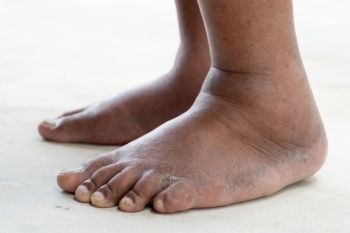Items filtered by date: January 2025
Do You Suffer From Painful Feet?
How Vitamins Can Help Combat Plantar Fasciitis Pain

Plantar fasciitis is a common cause of heel pain, and while treatment often involves specific stretches and wearing proper footwear, certain vitamins and supplements can help manage symptoms and promote healing. Bromelain, an enzyme found in pineapple, is known for its anti-inflammatory properties and can reduce swelling and pain associated with plantar fasciitis. Vitamin C is essential for collagen production and tissue repair, supporting the healing of the plantar fascia. Vitamin B5, or pantothenic acid, helps in the regeneration of damaged tissues and reduces inflammation. Magnesium plays a role in muscle function and can help alleviate tightness in the calf muscles, which can contribute to plantar fasciitis pain. Turmeric, with its active compound curcumin, is another powerful anti-inflammatory that can help reduce pain and swelling in the affected area. When used alongside other treatments, these vitamins and supplements may provide additional relief and support recovery from plantar fasciitis. If you have plantar fasciitis, it is suggested that you schedule an appointment with a podiatrist.
Plantar fasciitis can be very painful and inconvenient. If you are experiencing heel pain or symptoms of plantar fasciitis, contact Priyanka Mude, DPM from North Canton Podiatry. Our doctor can provide the care you need to keep you pain-free and on your feet.
What Is Plantar Fasciitis?
Plantar fasciitis is the inflammation of the thick band of tissue that runs along the bottom of your foot, known as the plantar fascia, and causes mild to severe heel pain.
What Causes Plantar Fasciitis?
- Excessive running
- Non-supportive shoes
- Overpronation
- Repeated stretching and tearing of the plantar fascia
How Can It Be Treated?
- Conservative measures – anti-inflammatories, ice packs, stretching exercises, physical therapy, orthotic devices
- Shockwave therapy – sound waves are sent to the affected area to facilitate healing and are usually used for chronic cases of plantar fasciitis
- Surgery – usually only used as a last resort when all else fails. The plantar fascia can be surgically detached from the heel
While very treatable, plantar fasciitis is definitely not something that should be ignored. Especially in severe cases, speaking to your doctor right away is highly recommended to avoid complications and severe heel pain. Your podiatrist can work with you to provide the appropriate treatment options tailored to your condition.
If you have any questions please feel free to contact our office located in North Canton, Ohio . We offer the newest diagnostic and treatment technologies for all your foot and ankle needs.
Pros and Cons of Laser Treatment for Fungal Toenails

Laser treatment has become a popular option for treating fungal toenails, offering both advantages and limitations. One of the key benefits is its non-invasive nature, as the laser targets the fungus without the need for medications or surgical procedures. This method is typically painless, with minimal recovery time required. Additionally, laser treatment is effective in reaching the fungus deep within the nail, making it suitable for chronic or severe cases. However, there are some drawbacks to consider. Laser treatment can be costly and may not be covered by insurance, making it an expensive option for some individuals. Furthermore, multiple sessions may be required to achieve optimal results, and the treatment does not guarantee complete eradication of the fungus in every case. While many people find success with laser treatment, it is important to consult a podiatrist to determine if it is the right option for your specific condition. If you have toenail fungus, it is suggested that you contact this type of doctor who can determine if laser treatment is right for you.
Laser treatment can be an effective way to get rid of toenail fungus. If you have any questions about laser treatment, consult with Priyanka Mude, DPM from North Canton Podiatry. Our doctor will assess your condition and provide you with quality treatment for fungal nails.
What Are Toenail Fungal Infections?
Onychomycosis, or fungal infection of the nail, is a relatively common and non-serious condition. Around 10 percent of U.S. citizens are afflicted with fungal nails. Common forms of fungus that infect the nail include dermatophytes, yeasts, and molds.
Symptoms of Toenail Fungal Infections Include:
- Nail thickening
- Brittleness of the nail
- Discoloration of the nail
Diagnosis for Fungal Nails
Fungal infections are diagnosed by fungal culture and microscopy. This will rule out any other conditions such as nail trauma, psoriasis, lichen planus, and onychogryphosis.
What Is Laser Treatment?
Laser treatment is a non-invasive, safe, quick, and painless procedure that uses the heat from a laser to kill fungus in the nail. Each infected nail is targeted with a laser for several minutes. The treatment is usually utilized several different times over a select period. During this time, a podiatrist will keep an eye on the infection.
If you have any questions, please feel free to contact our office located in North Canton, Ohio . We offer the newest diagnostic and treatment technologies for all your foot care needs.
Causes and Dangers of Swollen Feet

Swollen feet and ankles, also known as peripheral edema, occur when fluid accumulates in the tissues of the lower limbs. This condition may be caused by various factors, including extended periods of standing or sitting, excess body weight, or medical conditions like venous insufficiency, where veins struggle to pump blood effectively. Injuries or infections in the foot or ankle may also lead to swelling due to increased blood flow to the affected area. While peripheral edema is often painless, swelling that is persistent or unusual may indicate underlying issues such as blood clots, lymphedema, or certain hormonal changes. A podiatrist can evaluate the cause of swelling and rule out serious complications. This foot doctor also can recommend ways to improve circulation, manage discomfort, and prevent long-term damage to the feet, toes, and ankles. If you have unusually swollen feet or ankles, it is suggested that you schedule an appointment with a podiatrist for an exam and diagnosis.
Swollen feet can be a sign of an underlying condition. If you have any concerns, contact Priyanka Mude, DPM of North Canton Podiatry. Our doctor can provide the care you need to keep you pain-free and on your feet.
Swollen feet are a common ailment among pregnant women and people who stand or sit for extended periods. Aging may increase the possibility of swollen feet and patients who are obese often notice when their feet are swelling too. There may be medical reasons why swollen feet occur:
- Phlebitis - A condition that causes the veins to become inflamed and can also cause leg pain.
- Liver disease - This may lead to low blood levels of albumin which is a protein. This can cause fluid in the blood to pass into the tissues and several areas of the body can become swollen.
- Heart failure - When the heart doesn’t pump properly the blood that is normally pumped back to the heart can pool in the veins of the legs causing swollen feet.
- Kidney disease - One of the main functions of the kidneys is releasing excess fluid in the body. This type of condition can make it difficult for the kidneys to function properly, and as a result the feet may become swollen.
- Deep-vein thrombosis (DVT)- This is a serious condition where blood clots form in the veins of the legs. They can block the return of blood from the legs to the heart which may cause the feet to swell. It is important to be treated by a podiatrist if this condition is present.
Swollen feet can also be caused by bone and tendon conditions, including fractures, arthritis, and tendinitis. Additionally, there may be skin and toenail conditions and an infection may cause the feet to swell. Patients who take medicine to treat high blood pressure may be prone to getting swollen feet.
Many patients elevate their feet to help relieve the swelling and this is generally a temporary remedy. When a podiatrist is consulted the reason behind the swelling can be uncovered and subsequently treated.
If you have any questions please feel free to contact our office located in North Canton, Ohio . We offer the newest diagnostic tools and technology to treat your foot and ankle needs.
Understanding Foot Cramps

Foot cramps are sudden, involuntary muscle contractions that can cause sharp, intense pain in the feet. These cramps are often caused by dehydration, imbalances in electrolytes like potassium or magnesium, or prolonged periods of standing or walking. Wearing ill-fitting shoes can also strain the muscles, leading to cramps. Overuse or excessive physical activity, especially without proper stretching beforehand, can trigger foot cramps as well. To find relief from foot cramps, gently stretching and massaging the affected foot can help relax the muscles. Ensuring proper hydration and consuming foods rich in essential minerals can help prevent cramps. If cramps are frequent, it may be helpful to review footwear choices and incorporate daily stretching into your routine. Foot cramps can be painful, and may hinder completing daily activities. If you have these types of cramps, it is suggested that you consult a podiatrist who can pinpoint the cause, and offer effective relief methods.
Foot Pain
Foot pain can be extremely painful and debilitating. If you have a foot pain, consult with Priyanka Mude, DPM from North Canton Podiatry. Our doctor will assess your condition and provide you with quality foot and ankle treatment.
Causes
Foot pain is a very broad condition that could be caused by one or more ailments. The most common include:
- Bunions
- Hammertoes
- Plantar Fasciitis
- Bone Spurs
- Corns
- Tarsal Tunnel Syndrome
- Ingrown Toenails
- Arthritis (such as Gout, Rheumatoid, and Osteoarthritis)
- Flat Feet
- Injury (from stress fractures, broken toe, foot, ankle, Achilles tendon ruptures, and sprains)
- And more
Diagnosis
To figure out the cause of foot pain, podiatrists utilize several different methods. This can range from simple visual inspections and sensation tests to X-rays and MRI scans. Prior medical history, family medical history, and any recent physical traumatic events will all be taken into consideration for a proper diagnosis.
Treatment
Treatment depends upon the cause of the foot pain. Whether it is resting, staying off the foot, or having surgery; podiatrists have a number of treatment options available for foot pain.
If you have any questions, please feel free to contact our office located in North Canton, Ohio . We offer the newest diagnostic and treatment technologies for all your foot care needs.

